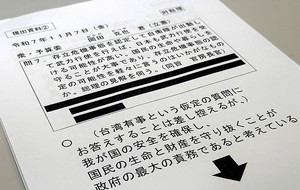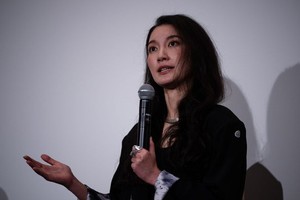THE ASAHI SHIMBUN
April 23, 2025 at 08:00 JST
 Nepalese freshmen students who are studying information technology in business at a vocational school in Chiba Prefecture attend a job fair organized by the prefectural authorities at the Makuhari Messe convention hall in Chiba on Dec. 12. (Saori Kuroda)
Nepalese freshmen students who are studying information technology in business at a vocational school in Chiba Prefecture attend a job fair organized by the prefectural authorities at the Makuhari Messe convention hall in Chiba on Dec. 12. (Saori Kuroda)
CHIBA--Students descended on a job fair organized by the Chiba prefectural authorities at the Makuhari Messe convention hall here in December.
“Do you have a five-day workweek?” one of the students asked a company representative. Another asked about bonuses.
A third participant asked if workers’ wages vary with their level of Japanese proficiency.
The fair was attended by 110 non-Japanese students living in the prefecture, who threw out a barrage of questions over job descriptions and wages.
Fourteen companies based in the prefecture, including security agencies and machinery manufacturers, set up booths.
The event is one of the numerous job fairs that are being organized by local governments across Japan to connect non-Japanese students and technical intern trainees with Japanese companies interested in employing or hosting them.
The Chiba prefectural government started the job fair program in fiscal 2024 after learning about small and midsize businesses in the prefecture that wanted to hire non-Japanese because of labor shortages but didn't know how to do so.
Kaku Shigeta, president of Think Laboratory Co., attended the job fair in Chiba. Think Laboratory is a print machinery manufacturer based in the city of Kashiwa in the prefecture.
“We are hiring non-Japanese because few Japanese workers with science backgrounds are available for employment,” Shigeta said. “I am here for the opportunity to connect with non-Japanese students.”
One student participating in the fair was a 23-year-old Nepalese who was attending a vocational school on information technology in business.
“I want to remain in Japan and work for a company where I could get proper bonuses and earn a good salary,” she said. “But I wouldn't care even if the job was outside Chiba Prefecture.”
In fact, stopping a drain of non-Japanese personnel from the prefecture is a major challenge for prefectural authorities.
Less than 30 percent of the non-Japanese students in Chiba Prefecture who landed jobs in Japan in fiscal 2023 did so within the prefecture, officials said.
“Many of the rest likely flocked to Tokyo,” said a prefectural official. “We want those who have come all the way down to Chiba Prefecture to stay and work in Chiba Prefecture.”
The prefectural authorities are putting much effort into the job-matching program as a measure for encouraging non-Japanese to remain and work in the prefecture.
SAGA PREFECTURE CHOICE OF NON-JAPANESE WORKERS
Forty-four of the governments of all 47 prefectures and 20 ordinance-designated major cities of Japan had organized job fairs after Japan introduced the “specified skilled worker” system in April 2019, according to a survey conducted by The Asahi Shimbun in October last year.
The count rises to 47, or 70.1 percent of all corresponding local governments, if those that had plans to organize similar fairs are also included. Major active efforts had been made since 2023, the year the COVID-19 pandemic ended.
The governments of Miyagi, Mie and Okinawa prefectures have even organized job fairs overseas.
Figures of the Immigration Services Agency show the number of foreign residents in Japan grew 10.5 percent during a one-year period from the end of 2023 through the end of 2024.
By prefecture, the growth rate was the third largest in Saga Prefecture, at 16.3 percent, after Hokkaido and Miyazaki Prefecture.
Amid a general depopulation trend, Saga Prefecture, largely seen as a provincial area, saw a “social increase of population,” which means more people moving in than leaving, during the year through Oct. 1, 2023, for the first time in 28 years.
By citizenship, 1,368 more Japanese left than arrived but 1,668 more non-Japanese moved in than departed, resulting in a total social increase of 300.
Saga prefectural authorities, who have been working for some time to promote a “multicultural coexistence,” organized its first job fair in 2024 in hopes of attracting even more non-Japanese.
The “Sagashiru Global,” as the event was called, was held in September.
Thirty non-Japanese students living in Saga Prefecture and representatives of 13 tourism and manufacturing companies met at the fair.
The event was well received by the non-Japanese students, who said they learned that there are so many good potential employers in the prefecture.
In addition, the corporate representatives also praised the event, saying they got to know many students of superior ability that they wished to hire, officials said.
Tomokazu Nozaki, head of the prefectural government’s industry personnel division, said he feels that the efforts are paying off.
“Saga Prefecture is so compact that a local government can tell what kinds of non-Japanese students enrolled at which schools,” Nozaki said. “That allows us, prefectural officials, to look for potential employers that would match the students. We want those students to stay in Saga Prefecture as supporters of our community livelihoods.”
Simply providing job opportunities alone does not ensure that more non-Japanese students will take root in the areas they studied in.
Satoru Suzuki, an official with the Japan External Trade Organization (JETRO), attended the job fair held at Makuhari Messe in December.
Suzuki provided assistance to businesses as a “coordinator for the promotion of highly skilled foreign professionals.”
“Businesses that just wish to hire to meet a labor shortage will not be chosen by non-Japanese job seekers,” he said, adding that recruiting companies should present attractive job prospects that show how they plan to draw on the potential of the job seekers once they are on the payroll.
The recruiting companies could, for example, offer positions in charge of a new overseas project or serve as an intermediary between non-Japanese part-timers and technical intern trainees and the Japanese management.
“Non-Japanese students are in a seller’s market now,” Suzuki said. “Businesses that wish to be chosen by them should show what advantages the non-Japanese could gain by working for their companies.”
(This article was written by Saori Kuroda and Makoto Oda.)




















A peek through the music industry’s curtain at the producers who harnessed social media to help their idols go global.
A series based on diplomatic documents declassified by Japan’s Foreign Ministry
Here is a collection of first-hand accounts by “hibakusha” atomic bomb survivors.
Cooking experts, chefs and others involved in the field of food introduce their special recipes intertwined with their paths in life.
A series about Japanese-Americans and their memories of World War II